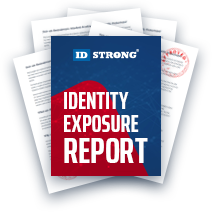Protect Your Loved Ones From Identity Theft After They Are Deceased
Table of Contents
- By David Lukic
- Published: Feb 23, 2021
- Last Updated: Mar 18, 2022
Identity theft is a prevalent crime that you have to watch out for, even after death. Criminals use deceased persons' identities to commit fraud. According to the AARP, roughly 2,200 deceased people are the victims of identity theft every single day. This practice is often called "ghosting."
Where Do Identity Thieves Get Deceased Persons' Information?

There is a period of time between when your loved one dies, and government agencies, banks, and the credit bureaus are informed of their death where an identity thief could grab their information, open credit card accounts, purchase cell phones, rent property, charge debt, or access other benefits before they are shut off.
A lot of our personal information is now stored online in huge databases, which allows better access but also poses a risk for identity theft. These criminals may get your deceased loved one's information from obituaries, stolen death certificates, hospitals, funeral homes, genealogy websites, or searching the Social Security Death Index.
Ironically the Social Security Death Index was created to avoid identity theft by informing insurance companies, government agencies, and financial institutions when people die. It contains roughly 83 million records. Even with the technological advances, some companies or organizations take months to update their files. During that time, identity thieves could potentially use the deceased person's identity for fraud.
How You Can Protect Your Deceased Loved One's Identity
Thankfully, as awful as this crime is, there are steps you can take to protect your loved one's identity after death.
First, you are going to need roughly 12 copies of your loved one's death certificate. Some of the places will accept a photocopy, but most will need a certified copy. Order those as soon as possible for the next steps.
How To Report a Death To Social Security Administration
A funeral director will often report the death to the Social Security Administration, but this step could be overlooked. Send a death notification yourself along with a copy of the death certificate to the SSA and send it "return receipt required." That will prevent it from being tampered with within the mail system. Legally, the executor of the will is responsible for notifying the SSA and other government agencies of the death.
When contacting the Social Security Administration to let them know your family member has died, you can reach them by phone at 1-800-772-1213 to apply for survivor benefits. When contacting the SSA, you can also request that they lock your loved one's social security number to prevent anyone from rerouting mail regarding SSA benefits.
Notify the Internal Revenue Service
Notify the Internal Revenue Service (IRS) that your loved one has passed away. This will prevent identity thieves from filing any tax returns on your loved one's behalf. Make sure to send a copy of the death certificate to the same address where your loved one would have filed their tax return. You may also have to file a final year for your loved ones after they are deceased.
Notify the Major Credit Reporting Agencies
Notify all three credit reporting bureaus (Equifax, TransUnion, and Experian) of your loved one's death. Ask that they put a "deceased alert" on the file so that no one can actively use it. If your loved one was a spouse or you are the executor of their will, you can request a copy of their credit report from each of the bureaus to review it for inaccuracies or suspicious activity. You can also use these copies to look for creditors, loans, and accounts that you need to contact and notify and close.
Contact All Financial Institutions
Contact all financial institutions, including banks, credit cards, lien holders (for car loans and mortgages), and stockbrokers to alert them of your deceased. If any of the accounts are joint accounts, they may be turned into individual accounts. Request that the creditor marks the account as "closed" or "deceased" to prevent anyone from re-opening it and using it.
Keep Your Loved One's Private Documents Secure
Keep all your loved one's private documents secure. That includes their death certificate (if you have copies leftover) and other things with their name, social security number, birthdate, mother's maiden name, and other identifiers like driver's license number or passport number.
Some other possible places to notify of your loved one's passing are:
-
The Veteran's Administration (if they served in the military).
-
Insurance companies for auto, health, life, etc.
-
The Department of Motor Vehicles (DMV) to notify them of the death and transfer ownership and the vehicle registration into a survivor's name.
-
Local memberships for the gym, video rental, public library, etc.
-
Professional licensing associations such as the medical board, the bar association, and the chamber of commerce.
-
Immigration Services if your loved one was not a U.S. citizen.
Other Tips to Keep Your Loved One Safe
When crafting your loved one's obituary, do not include their birth date or mother's maiden name, birthplace, and relative's names. These are key identifiers that identity thieves look for and use to steal someone's ID. Also, do not include the person's home address. Sometimes identity thieves show up for the funeral or wake and burglarize the home for information.
Whenever you send out a copy of your deceased's death certificate, send it "return receipt requested." This will keep it safe as it travels through the post office.
As you contact each agency or organization, keep all records secure. Print out emails or receipts and keep them together in a locked location with their private/sensitive information. You may need it later to prove that you notified someone of the death.
Although the danger of an identity thief is very real, you must also be cautious of those around you. There are dozens of horror stories online about family members stealing and using a deceased person's identity for their own personal gain. That type of fraud is common so if anyone in your family asks a lot of personal questions, let that be a red flag to secure your loved one's information and keep it away from prying eyes and safe.



















































































































